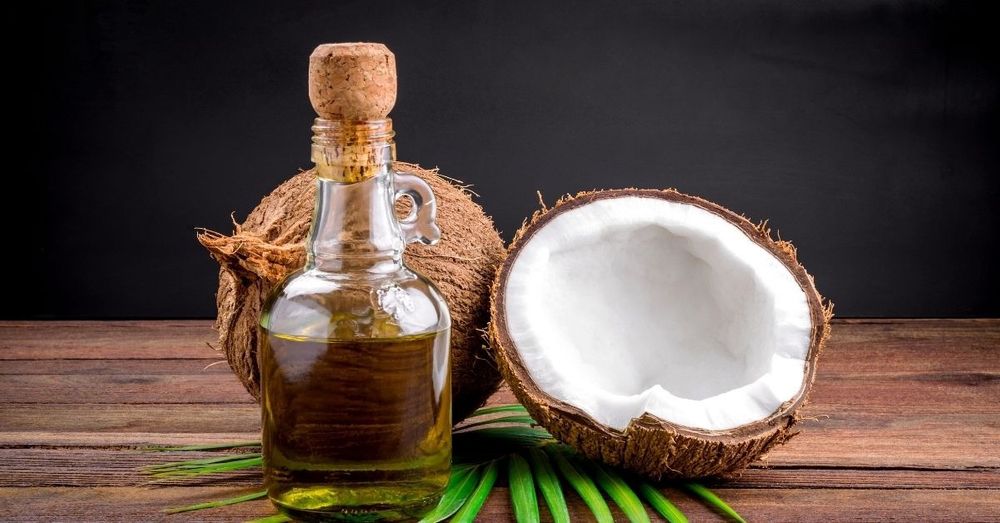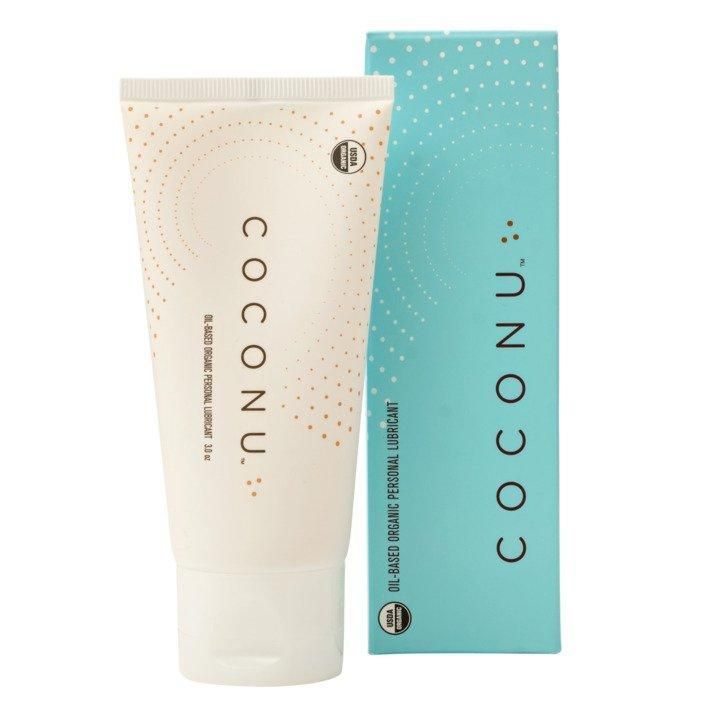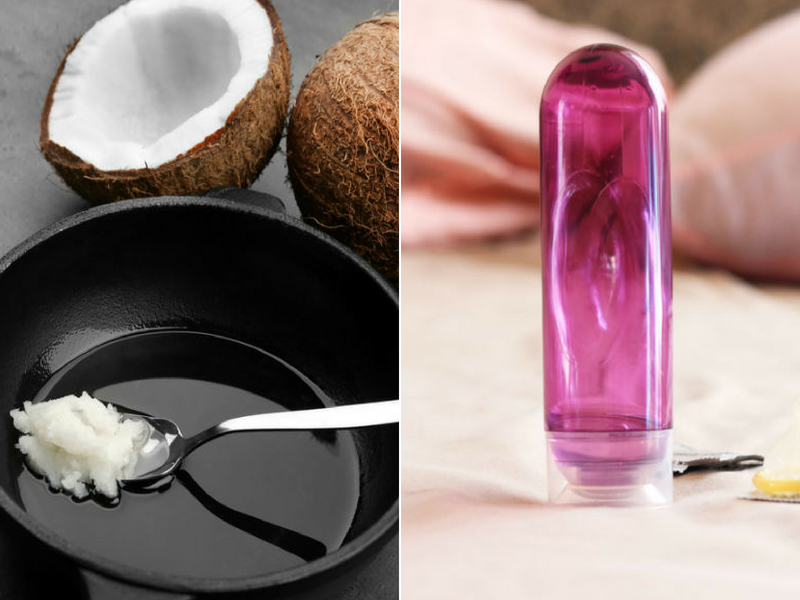Introduction
When it comes to personal intimacy, comfort and pleasure are paramount. Many individuals and couples reach for lubricants to enhance their experience, and in the quest for natural alternatives, a common question arises: can you use coconut oil for lube?
Coconut oil can be used as a natural lubricant due to its moisturizing and antimicrobial properties. Choose unrefined, virgin oil without additives. Warm a small amount, apply gently, and reapply as needed.
In this article, we’ll explore the potential risks and benefits of using coconut oil as a personal lubricant, compare it with other types of lubes, and provide you with detailed information to make an informed decision about your intimate health.
Potential risks of using coconut oil as lube

Effectiveness as a lubricant
Coconut oil has gained popularity for its versatility and natural origin, but how effective is it as a lubricant? While it can provide a slick and moisturizing feel, there are a few considerations to keep in mind. Coconut oil is not water-soluble, which means it can be difficult to wash off and may leave a residue on skin and fabrics. Additionally, it can degrade latex, which is a significant drawback if you rely on latex condoms for protection against STIs and pregnancy.
Potential for disrupting vaginal pH balance
The vaginal environment is delicately balanced, and introducing foreign substances can sometimes cause more harm than good. Coconut oil has the potential to alter the natural pH of the vagina, leading to an increased risk of infections such as bacterial vaginosis or yeast infections. It’s important to consider how your body reacts to coconut oil before using it internally.
Possible allergic reactions
Although rare, some individuals may have an allergic reaction to coconut oil. Signs of an allergic reaction can include itching, redness, and swelling. If you have a history of allergies or sensitive skin, it’s crucial to perform a patch test before using coconut oil as a lubricant.
Safe alternatives for lube

While coconut oil is a popular natural lubricant for some people, it’s essential to note that it is not compatible with latex condoms and may increase the risk of condom breakage. If you’re looking for alternative lubricants, here are some options that are generally safe and compatible with latex condoms:
- Water-Based Lubricants:
- Water-based lubricants are widely available and compatible with condoms.
- Examples include brands like Astroglide, KY Jelly, and Sliquid H2O.
- Silicone-Based Lubricants:
- Silicone-based lubricants are also condom-compatible and provide a longer-lasting glide compared to water-based options.
- Brands like Pjur and Wet Platinum offer silicone-based lubricants.
- Glycerin-Free Lubricants:
- Some individuals may be sensitive to glycerin, so choosing a glycerin-free lubricant can be a good option.
- Sliquid Sassy, Good Clean Love Almost Naked, and Aloe Cadabra are examples of glycerin-free options.
- Aloe Vera Gel:
- Pure aloe vera gel, without added fragrances or other additives, can be used as a natural lubricant. Ensure it’s pure and doesn’t contain any harmful ingredients.
- Commercial Natural Lubricants:
- Look for lubricants specifically labeled as natural and free from harsh chemicals. Brands like Aloe Cadabra and Good Clean Love offer natural options.
- Homemade Water-Based Lubricant:
- You can make a simple water-based lubricant at home using ingredients like water and xanthan gum. However, be cautious with homemade lubricants to avoid introducing bacteria. Always use clean utensils and make small batches.
Benefits of using coconut oil as lube
However, using coconut oil as a lubricant does have some potential benefits, and many people find it to be a suitable and natural option. Here are some of the perceived benefits:
- Natural Moisturizing Properties:
- Coconut oil is known for its moisturizing properties. It can help hydrate the skin and mucous membranes, providing a smooth and comfortable glide during intimate activities.
- Antibacterial and Antifungal Properties:
- Coconut oil contains lauric acid, which has antimicrobial properties. This may help prevent the growth of bacteria and fungi, potentially reducing the risk of infections.
- Reduction of Friction and Irritation:
- The lubricating properties of coconut oil can reduce friction during sexual activities, which may lead to less irritation and discomfort. This can be particularly beneficial for individuals who experience dryness.
- Natural and Readily Available:
- Coconut oil is a natural substance that is readily available in many households. Some people appreciate using natural products without added chemicals or synthetic ingredients.
How to use coconut oil as lube?
Using coconut oil as a lubricant can be a straightforward process, but it’s important to choose the right type of coconut oil and follow some guidelines for application and cleanup. Here’s a step-by-step guide:
Choosing the Right Type of Coconut Oil:
- Opt for Unrefined, Virgin Coconut Oil:
- Choose an unrefined, virgin coconut oil, preferably organic. Unrefined coconut oil retains more of its natural properties, including its moisturizing and antimicrobial benefits.
- Ensure It’s Pure:
- Check the ingredients list to ensure that the coconut oil is pure and doesn’t contain additives, fragrances, or other potentially irritating substances.
Application:
- Scoop a Small Amount:
- Use a clean utensil or your fingers to scoop a small amount of coconut oil. You can start with a teaspoon-sized amount and adjust as needed.
- Warm It Up:
- Coconut oil has a solid form at room temperature, so you may want to warm it up slightly by rubbing it between your hands or placing the container in warm water. This makes it easier to apply.
- Apply to Desired Areas:
- Gently apply the coconut oil to the desired areas. It can be used externally for genital lubrication, but be cautious about using it internally, especially for vaginal intercourse, as it may alter the pH balance.
- Reapply as Needed:
- Coconut oil tends to absorb into the skin over time, so you may need to reapply as necessary to maintain lubrication.
Cleanup:
- Use a Towel or Tissue:
- Have a towel or tissue nearby for easy cleanup. Coconut oil can be greasy, so wiping off excess oil can help prevent staining.
- Wash with Warm Water:
- After use, wash the application area with warm water. You can use a mild, unscented soap if desired. Avoid harsh soaps or cleansers that may disrupt the natural balance of the skin.
- Clean Bedding or Clothing:
- If coconut oil comes into contact with sheets or clothing, you may want to pre-treat and launder them as necessary to avoid stains.
Important Considerations:
- Not Compatible with Latex:
- If you’re using condoms for contraception or STI prevention, choose a different lubricant that is compatible with latex.
- Perform a Patch Test:
- If you have sensitive skin or are unsure about potential allergies, perform a patch test on a small area before widespread use.
- Communication:
- Communicate with your partner about using coconut oil as a lubricant, especially if it’s the first time. Ensure that both partners are comfortable with the choice of lubricant.
Always listen to your body and be attentive to any signs of irritation or discomfort. If you experience any adverse reactions, discontinue use and consult with a healthcare professional.
Conclusion
In conclusion, using coconut oil as a lubricant can offer natural moisturizing and antimicrobial benefits, making it a popular choice for some individuals. When using coconut oil, it’s crucial to choose the right type, opting for unrefined, virgin coconut oil without additives.
Application involves warming a small amount and gently applying it to desired areas, with reapplication as needed. Cleanup can be done with a towel and warm water, and caution is advised with clothing and bedding to prevent stains.
However, it’s essential to be aware of potential limitations, such as the incompatibility of coconut oil with latex condoms, the need for a patch test if you have sensitive skin, and the importance of communication with your partner.
Always prioritize your comfort and well-being, and if you encounter any adverse reactions, consider consulting with a healthcare professional for personalized advice. Ultimately, individual preferences and considerations should guide the choice of lubricant for a positive and enjoyable experience.
FAQ
Can you actually use coconut oil as lube?
“Studies have shown that coconut oil is clinically proven for safe and effective use as a moisturizer. Its moisturizing properties may make the product an effective lube and allow for longer-lasting intercourse,” says Jessica Shepherd, M.D., an OB/GYN at the University of Illinois at Chicago and advisor with Happy V. Sep 27, 2023
Can oil be used as lubricant?
Although it is best to purchase and use water-based or silicone-based lubricants, there are alternatives people can consider if they are unable to do this. These include aloe vera, yogurt, olive oil, and virgin coconut oil.
How to make coconut oil lube?
3 parts organic coconut oil (or fractionated coconut oil). 2 parts aloe vera gel. 2 parts organic olive oil. 5 drops ylang ylang or lavender essential oil. Mason jar.
Does coconut oil affect sperm?
In general, there is little evidence to support the claim that coconut oil is an effective method of contraception. While it is true that coconut oil has antimicrobial properties that may kill some bacteria and viruses, there is insufficient evidence to support the idea that it can effectively kill sperm.
Originally posted 2023-12-08 09:47:55.


